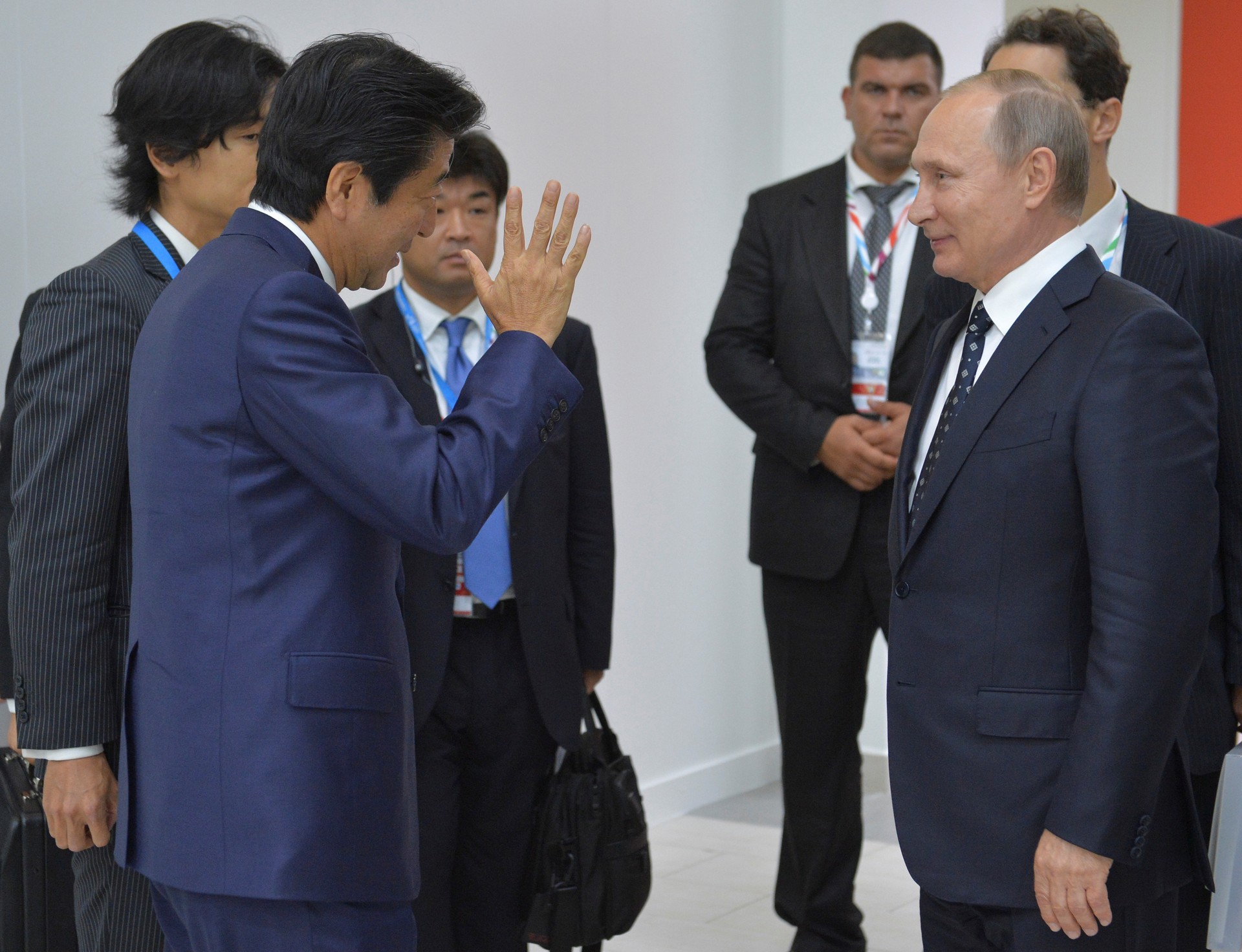Russia–Japan Relations: Slowly but Surely
In
Login if you are already registered
(no votes) |
(0 votes) |
Vladimir Putin will pay an official visit to Japan on December 15, 2016. The President of the Russian Federation and his Japanese counterpart confirmed the news during the recent Eastern Economic Forum in Vladivostok. The fact that the visit, which had been consistently postponed since 2014, has finally materialized indicates that bilateral relations between the two countries continue to stabilize.

Sputnik/Kremlin/Alexei Druzhinin/via REUTERS
Japanese Prime Minister Shinzo Abe (L) speaks with Russian President Vladimir Putin during the Eastern Economic Forum in Vladivostok, Russia, September 3, 2016.
But it turns out that these delays have had their advantages. The leaders, both of whom are hardly newcomers to their posts, have used the time to build a relationship based on trust and launched parallel institutionalized initiatives. At an informal meeting in Sochi, Abe proposed a new approach to resolving the territorial dispute, which was seen by Japanese experts as a departure from the principles of the 1993 Tokyo Declaration on Japan–Russia Relations. In response to the eight-point plan of economic cooperation put forward by Abe in Sochi, Minister of Economic Development of the Russian Federation Alexey Ulyukaev presented a counter plan consisting of 49 points during his visit to Tokyo in July. Prime Minister Abe would later announce that Japan was prepared to provide economic assistance to Russia’s Far East regions, even though the territorial dispute over the Kuril Islands would not be settled. As recently as August 26, Deputy Minister of Foreign Affairs of the Russian Federation Igor Morgulov led the third round of diplomatic talks with the Head of the Japanese Mission to Russia, Ambassador Tikahito Harada, in Moscow. In all likelihood, setting up meetings between the head of Japan’s National Security Council, and chief foreign policy adviser to Shinzo Abe, Shotaro Yachi and his Russian counterpart Nikolai Patrushev favoured bilateral relations.
What is more, it just so happened that the cabinet reshuffle carried out by Abe following the July elections to the upper house elevated a number of politicians who have ties with Russian to important positions within the government. For example, Tomomi Inada, who took part in the Russia–Japan business mission to Tokyo in February and who then visited Moscow in April, was named Minister of Defence, while Hiroshige Seko, who had previously headed the public-private Coordination Council for the Development of Relations with Russia, was made Minister of Economy, Trade and Industry (METI). The Japanese media reported recently that Prime Minister Abe had Hiroshige Seko also occupy a new ministerial post responsible for developing relations with Russia.
Against this background, the meeting between Vladimir Putin and Shinzo Abe on the fringes of the Eastern Economic Forum, which focused, among other things, on economic cooperation, looks extremely promising, as do the visit of the Russian President to Japan and the issue of the Kuril Islands, as well as the fact that Moscow is trying to balance interests in relations with its East Asian neighbours. And no matter how much we might want more specifics in terms of the agreements, the fact that they are more general is not a problem considering the sensitivity of the issue. The informal nature of the talks – the “meeting without ties” in Sochi and the invitation extended by Abe for Putin to visit his honseki chi (registered residence) and constituency of Nagato in Yamaguchi Prefecture – serves as evidence. Yamaguchi Prefecture is the historical ancestral lands of the Chōshū samurai clan (in terms of significance, it is similar to Putin’s visit to George W. Bush’s Prairie Chapel Ranch). It is possible that the month of December has been chosen for the Russian President’s visit on purpose, that is, until after the U.S. presidential election, the result of which is of great interest to Tokyo. It is also symbolic that the Soviet–Japanese Joint Declaration came into force 60 years ago, in December 1956. On the whole, the transition on the part of the leaders from expectations of breakthrough agreements being made to more sober and meticulous work is evidence that they are trying to make the most of the “window of opportunity” that has presented itself, carefully demonstrating their political will. And that in itself is extremely important.
(no votes) |
(0 votes) |




